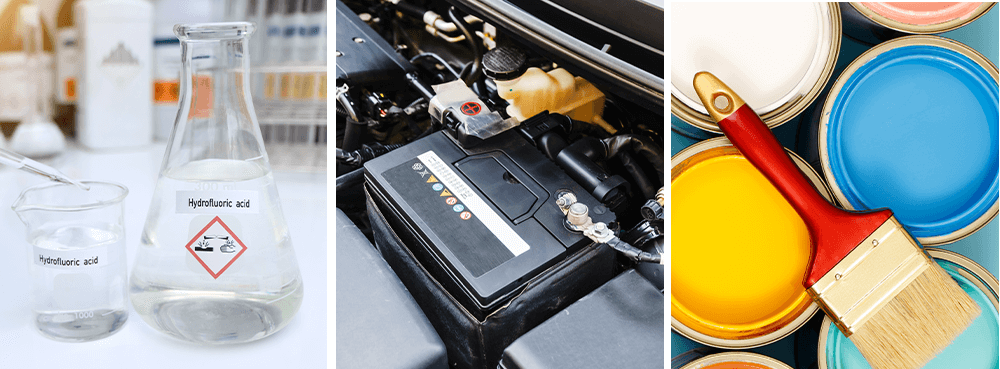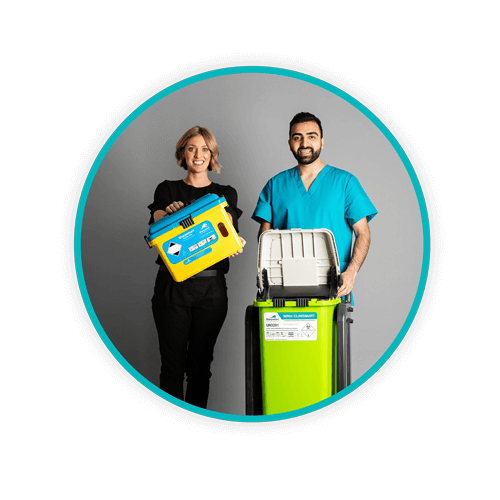What is Chemical Waste? – 10 Examples

Are you aware of the everyday products in your workplace that may pose a threat to your health and the environment? Chemical waste can be found in many surprising places…
From hospitals and laboratories to industrial and retail settings, the proper disposal of chemical waste is essential for environmental protection and human health. Chemical waste, which can range from toxic chemicals in hospitals to everyday cleaning products, requires careful handling to comply with legal standards and avoid hazardous risks.
This blog will define chemical waste, examine the issues with improper disposal, and offer best practices for managing and disposing of it safely and in line with regulations.
TOPICS WE WILL COVER:
3 / Chemical Waste Examples in Hospitals
4 / The Importance of Proper Chemical Waste Disposal
5 / How to Dispose of Chemical Waste Safely
6 / Sharpsmart’s Chemical Waste Disposal
7 / Get Started with Sharpsmart Today
What is Chemical Waste?
Chemical waste refers to any waste material that contains or has been contaminated by chemicals. It can be solid, liquid, or gaseous and may arise from various industries, including healthcare, manufacturing, and even retail.
Chemical waste is divided into two broad categories: hazardous and non-hazardous. Hazardous waste poses a significant risk to human health and the environment, while non-hazardous waste, although less dangerous, still requires careful management.
Chemical Waste Examples
Some chemical waste is obvious, but some might take you by surprise.
Here are common examples of chemical waste you may encounter in various industries:
- Waste oils – Includes oils such as diesel, kerosene, and gearbox oils.
- Batteries – All types of batteries, from household to industrial, contain chemicals that need careful disposal.
- Solvents – Common in labs and workshops, these include ethanol, methanol, and acetone.
- Cleaning products – Disinfectants, wipes, and sprays used in both healthcare and retail settings.
- Chemically contaminated sharps – Needles, syringes, and lancets used in medical settings and contaminated with hazardous chemicals.
- Pesticides – Substances used in agriculture, pest control, and landscaping, such as insecticides and herbicides.
- Printer toner and ink cartridges – These contain chemicals that can cause environmental harm if not disposed of correctly.
- Used aerosol cans – Commonly found in households and businesses, these include products like deodorants and air fresheners.
- Fluorescent light bulbs – Contain harmful chemicals such as mercury vapour.
- Laboratory chemicals – Widely used in healthcare, laboratories, and research facilities, these include reagents and compounds that pose serious risks.
Chemical Waste Examples in Hospitals
Healthcare facilities generate a significant amount of chemical waste, which must be managed in line with regulations to protect both patients and healthcare workers.
Common chemical waste examples in hospitals include:
- Laboratory chemicals – Used in tests and research.
- Pharmaceuticals and medicines – Expired or contaminated drugs.
- Disinfectants and cleaning products – Essential for sterilisation but hazardous if improperly disposed of.
- Chemotherapy drugs – Powerful chemicals used in cancer treatment that require special handling.
- X-ray processing chemicals – Used to develop medical images.
Each type of healthcare waste must be segregated and disposed of according to strict guidelines to avoid contamination or accidental exposure.
The Importance of Proper Chemical Waste Disposal
Improper disposal of chemical waste can have severe consequences, including environmental degradation, health risks, and legal penalties. The Environmental Protection Act 1990 (EPA) and the Health and Safety at Work Act 1974 regulate the handling, storage, and disposal of hazardous waste, imposing strict requirements to ensure safety and compliance.
Effects of Chemical Waste on the Environment
The negative effects of chemical waste on the environment cannot be ignored. Improper disposal can lead to soil and water contamination, which can therefore:
- Poison wildlife and ecosystems.
- Disrupt food chains, leading to an accumulation of toxins in animals and plants.
- Cause long-term damage to natural resources, making land and water unusable.
A £2.3 million study led by the UK Centre for Ecology & Hydrology (UKCEH) is investigating the impacts of chemical pollutants from coastal landfill waste on UK seabirds, revealing concerning environmental effects. The research highlights that coastal landfill sites contain a mixture of toxic chemicals, including unused medicines, pesticides, flame retardants, metals, and plastics, which can be harmful to organisms in the environment.
Mishandling chemical waste poses a direct threat to public health. Toxic chemicals can leach into water supplies, affecting not just wildlife but also human populations. Given these risks, it is essential to learn how to dispose of chemical waste safely.
How to Dispose of Chemical Waste Safely
Effective disposal of chemical waste is not only about removing harmful substances but also about ensuring compliance with strict regulations, such as the Environmental Protection Act 1990 (EPA) and Health and Safety at Work Act 1974. Compliance ensures not only safety and environmental protection but also avoids legal consequences, including fines.
Here are key steps to managing and disposing of chemical waste safely:
1. Identification and Segregation of Waste
Proper identification and segregation are the first and most important steps in the safe disposal of chemical waste. Separating hazardous from non-hazardous waste is essential to avoid contamination and ensure safe treatment and disposal. In hospitals, this might involve separating used chemicals from clinical or biological waste.
2. Proper Labelling
Every container holding chemical waste must be clearly labelled with the type of waste it contains and the associated hazards, such as flammability or toxicity. This not only keeps waste handlers safe but also ensures compliance with waste regulations.
3. Secure Storage
Chemical waste should be stored in secure, leak-proof containers to prevent spills, leaks, or accidental exposure. Containers must be resistant to corrosion, especially for substances with reactive or corrosive properties. In some cases, proper ventilation is required to manage the build-up of potentially dangerous fumes.
4. Chemical Waste Collection
Chemical waste should be collected by licensed waste disposal companies that adhere to regulatory guidelines, such as those outlined by the Environmental Protection Act 1990. These licensed professionals ensure that chemical waste is collected, transported, and disposed of according to the law.
5. Treatment and Removal: Where Does Chemical Waste Go?
Chemical waste must be treated and disposed of in licensed facilities that follow strict environmental guidelines. So, where does chemical waste go after collection? It can be processed using various methods, including:
- Reclamation – Certain chemicals, like mercury, can be reclaimed and reused through specialised treatment.
- Thermal treatment – Incineration or heat treatment to destroy hazardous components before being disposed of.
- Chemical treatment – Waste may undergo neutralisation or other treatments to reduce its toxicity.
It's best to avoid sending chemical waste to landfills unless absolutely necessary, as this can lead to environmental contamination.
6. Regular Review
To maintain effective chemical waste management, organisations should conduct regular audits to identify outdated practices and areas of improvement. A structured review process ensures that waste disposal procedures stay up-to-date with current regulations and best practices.
7. Employee Training & Awareness
Regular training and education for employees are critical in preventing mistakes and promoting compliance with chemical waste disposal regulations. Staff members must be aware of how to handle, store, and dispose of chemical waste safely.
Sharpsmart's Chemical Waste Disposal

In the healthcare industry, managing chemical waste is a complex and highly regulated process. This is where Sharpsmart steps in, offering expert solutions for safe and compliant chemical waste disposal.
With over 20 years of experience, Sharpsmart provides national service, 24-hour security, and comprehensive waste management tailored to the specific needs of healthcare facilities. From categorisation to collection, Sharpsmart can handle everything from toxic and flammable waste to laboratory chemicals, ensuring all hazardous materials are contained, collected, and disposed of in line with strict compliance regulations.
Our services are designed to reduce risk exposure, protect the environment, and offer traceable, cradle-to-grave waste management solutions. With geo-tracked vehicles, expertly trained staff, and accurate reporting on proof of destruction, Sharpsmart is a trusted partner for healthcare facilities seeking cost-effective and customer-focused chemical waste management.
Get Started with Sharpsmart Today
Don’t leave the safety of your staff, patients, or the environment to chance. Partner with Sharpsmart to ensure that your chemical waste disposal is handled with the utmost care and compliance. Our experienced team is ready to support you every step of the way, from identifying and segregating waste to final disposal.
Contact us today to learn more about our chemical waste services and how we can help you create a safer and more compliant waste management system for your facility.
